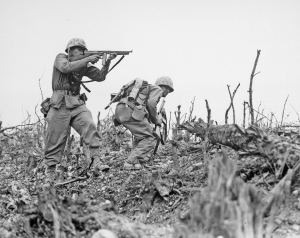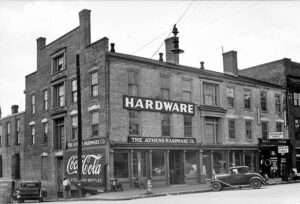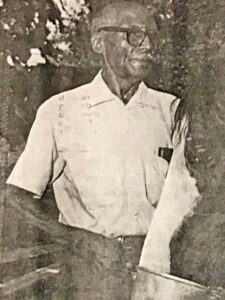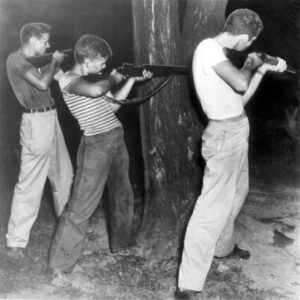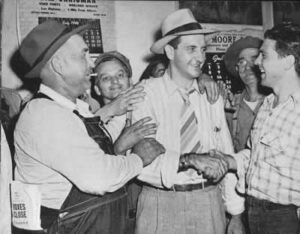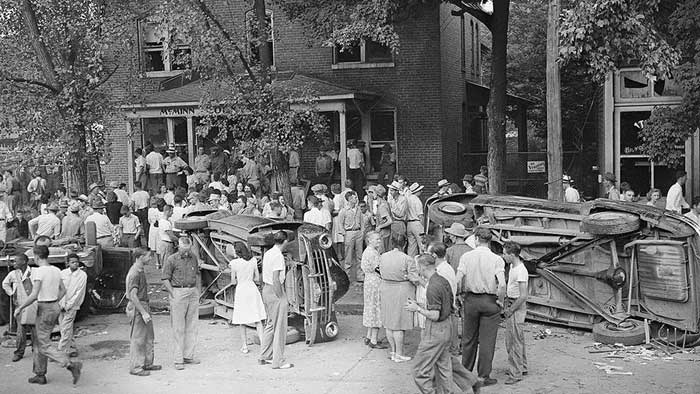
Battle of Athens, Tennessee aftermath.
How a group of veterans restored democracy to a small town.
By Paul Meany, Libertarianism.org, republished with permission.
“Eternal vigilance is the price of liberty” is a quote commonly, and incorrectly, attributed to Thomas Jefferson. It was, in fact, never uttered by Jefferson but instead by the Irishman John Philpott Curran, who wrote, “The condition upon which God hath given liberty to man is eternal vigilance, which condition if he breaks, servitude is at once the consequence of his crime, and the punishment of his guilt.”
The sentiment remains apt. We cannot stay free for long if we are not willing to scrutinize, critique, or -- at the most extreme end of the spectrum --resist the encroachments of the state upon the dignity, rights, and freedoms that every person deserves. Both America and Ireland rebelled against the British for their harsh treatment of both colonies. America became its own nation in 1776, but Ireland, being physically closer to the British, took until 1922. But the history in both countries also illustrates that revolutions are dangerous, messy affairs that require immense sacrifice and risk by those who oppose the powers that be.
That revolutionary sentiment wasn’t extinguished in America after the founding. One of the most fascinating and yet underappreciated episodes in American History is the Battle of Athens, which occurred in McMinn County, Tennessee, in 1946, the only successful armed rebellion in America since the American Revolution. Veterans returning from World War II to a county wracked by corruption and oppression saw no option but to take up arms. Their war against foreign tyranny was over, but their battle against the corrupt government in their hometown had just begun.
McMinn County, Tennessee, is nestled between Chattanooga and Knoxville in the mountainous southeast part of the state. It was created in 1819 and was named in honor of Joseph McMinn, a former militia commander in the Revolutionary War who was later elected governor of Tennessee. The two main cities of Mcminn are Etowah and Athens. By the 1940s, McMinn had roughly 30,000 inhabitants, most of whom were farmers, with some even living without electricity. The farmers would gather for social and political occasions in the city of Athens, the county seat, which had been nicknamed “the friendly city.” This description of small-town life hardly makes it seem like a place with revolutionary potential. But despite its demure size and remote location, the local government was astoundingly corrupt.
Enter the villain of this story, Paul Cantrell. Born in 1892 in Etowah, Cantrell came from a wealthy family. He and his siblings owned a lumber company, a motor company, the local water, light, and power utility, and a bank based in Etowah. There were few business deals in McMinn County that the Cantrells did not have a hand in. But Paul Cantrell’s ambitions shifted away from enterprise and towards politics. From the Civil War onwards, McMinn’s political offices were mainly held by Republicans. But by the 1930s, Tennessee increasingly came under the control of the Democratic party thanks, in part, to the political machine of Edward Hull Crump, which controlled much of Tennessee, including McMinn. Thanks to Crump’s backing, Cantrell ran as the Democratic candidate for sheriff in 1936. As was often the case in the rural South, the position of sheriff was the most critical position in McMinn, even more so than the town mayor or other local officials. Cantrell defeated his Republican opponent by a very slim margin. Citizens of McMinn were suspicious of foul play in the election, but they lacked concrete evidence of Cantrell’s alleged fraud. Because of this, the election came to be known as the “vote grab of 1936” among the citizens of McMinn.
Tennessee’s policing laws created perverse incentives, with sheriffs and their deputies collecting a fee for each person they arrested. Cantrell was already paid a generous sum of $5,000 a year for his position. (Adjusted for inflation, that is nearly $100,000 today.) Cantrell and his deputies quickly mastered how to abuse the fee system and began arresting people on trumped-up charges of public drunkenness to line their own pockets.
Cantrell’s cronies were so shameless in their abuse of power that they often stopped buses passing through the county, dragging out the sleepy passengers and telling them they needed to pay a fine for their imagined drunkenness. On a good weekend for Cantrell and his cronies, up to 115 people were arrested, and each fine meant more money. The only oversight deemed necessary for this system was a voucher signed by the sheriff, who, of course, was Cantrell, who had no qualms with this dubious system. To give some perspective of how rotten McMinn had become, from 1936 to 1946, $300,000 ($5 million today) was collected through these fees.
But Cantrell’s corruption stretched beyond fee system abuse. Cantrell and his men allowed roadhouses, brothels, and gambling dens to operate freely in exchange for a hefty protection fee. Cantrell’s deputies often raided roadhouses and shook down patrons using the familiar drunkenness charge. Once known as a friendly city, Athens was now quite unfriendly.
Encouraged by his lucrative, ill-gotten gains, Cantrell successfully stood for reelection as sheriff in 1938 and 1940, winning both elections yet again by suspiciously slim margins. In 1938 and 1940, Cantrell left nothing to chance. Precinct ballot boxes were gathered by Cantrell’s men and brought to the county jail to be counted. Anyone who attempted to watch these counts within Cantrell’s fortress was promptly labeled a troublemaker and forcibly removed. Poll tax receipts required for voting were often snatched from political opponents, and many who voted in favor of Cantrell were deceased. It became increasingly evident to the citizens of McMinn County that their elections were a farce. I wonder if Cantrell ever thought about how he undermined democracy while sitting in the jail of a city named after Athens, Greece, the birthplace of democracy.
George Woods, aan ally of Cantrell’ssuccessfully ran for state legislator in 1940. Woods introduced acts to reduce the number of voting precincts from 23 to a meager 12, effectively killing any chance of Republican opposition. Woods also helped cut down the number of justices of the peace from 14 to 7. Of the remaining seven justices, four were openly lackeys of Cantrell. The last Republican holdouts in the courts commanded the county to purchase voting machines in a futile attempt to make the elections more transparent. In retaliation, Cantrell used his connection with Woods to pass a bill that not only abolished the courts but also sold the new voting machines under the pretense of saving money.
In 1942, at the end of his fourth term as sheriff, Cantrell successfully stood for election as a member of the state legislature. Cantrell was succeeded — as both mini-monarch and local megalomaniac -- by his loyal crony and chief deputy Pat Mansfield. Mansfield was “elected” sheriff in 1942 using the same dubious tactics as his predecessor. By that time, America had joined the Second World War. Tennessee lived up to its nickname as the “volunteer state,” providing no less than 300,000 volunteers to join the fight against fascism abroad. McMinn was no different from the rest of Tennessee, with an admirable 3,000 young men volunteering to join the war effort, an incredible tenth of the total population of McMinn. Lacking police manpower, the newly elected Sheriff Mansfield resorted to hiring ex-convicts as his deputies.
If Cantrell was bad before, Mansfield was even worse. His grip on the county tightened as he suppressed the local newspaper and controlled personnel decisions at the public schools. A resident of Athens, Bill White, later recalled in an interview that “Mansfield had complete control of everything, schools and everything else. You couldn’t even get hired as a schoolteacher without their o.k., or any other job.”
Despite the overt corruption in McMinn County, state and federal authorities declined to intervene. Local residents repeatedly appealed to the Department of Justice in 1940, 1942, and 1944 for an investigation of election fraud. But every investigation fizzled out with no resolution or action taken. Little could be done to resist the petty tyranny established by Cantrell and further expanded by his protege Mansfield.
Those who left McMinn County to fight fascism abroad did not forget the vulgar fascism at home. Ralph Duggan, a resident of McMinn serving in the Pacific Navy, said that he spent more time worrying about his home of McMinn than he did about fighting the Japanese. Duggan’s anxiety would only be heightened further when he found out that Cantrell and Mansfield’s deputies shot two servicemen who were back home on leave.
When the war ended and the McMinn GIs were demobilized, they did not return to a pleasant welcome. Veterans were used to having a few drinks without being bothered by the authorities. But Mansfield and his gang of deputies and ex-convicts, aware that veterans’ pockets were flush with mustering out pay, targeted the veterans. Returning home after fighting for their country, veterans were beaten, arrested, and subjected to shakedowns by the very people who were meant to keep the peace.
By January of 1946, Mansfield’s term as sheriff was almost at an end. Mansfield planned on running for state legislator, while Cantrell decided he wanted to return to his position as sheriff. Cantrell’s reason for wanting to return to his sheriff position is unclear. One possible theory is that Cantrell missed the fee system’s lucrative profits as a sheriff, which outweighed the perks of being a state legislator.
Tired of being harassed and harangued, the McMinn veterans banded together to contest Cantrell’s and Mansfield’s regimes. In the early months of 1946, the veterans held meetings in secret to field their own list of candidates for the five positions up for grabs in the upcoming elections. The veterans met secretly, even going so far as to never meet twice in the same place to avoid Cantrell’s surveillance. The veterans went public with their campaign in May, two months before the election scheduled for August 1.
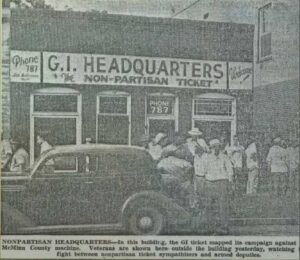
McMinn County Non-Partisan Headquarters 1946
Interestingly, this movement of veterans was distinctly non-partisan, with three of their candidates being Republicans and two belonging to the Democrat party. This was not a red or blue issue but right and wrong. Knox Henry, a decorated veteran of the North African Campaign, was chosen to stand against Cantrell.
The veterans’ message was clear and simple: they wanted reforms ensuring fair and transparent elections. Acknowledging the widespread resentment of those previous elections won through blatant fraud, the veterans made their motto, “Your vote will be counted as cast.” It was a simple democratic right but something the people of McMinn had not experienced for quite some time.
Cantrell attempted to sabotage the veteran’s chances of winning the election. The county had only one voter registration book for veterans, and, of course, whenever a veteran went to the courthouse to register, the book was missing. Veterans were also arrested, and their poll tax receipts were confiscated, thus making them ineligible to vote.
The veterans asked the FBI to send election monitors to ensure a fair election, but received no reply. Without help from the federal government, and knowing that Cantell would try voter intimidation, the veterans set up a militia of 60 men led by Bill White -- nicknamed the Fighting Bunch -- to help prevent violence or fraud in the upcoming elections.
But the veterans were not the only ones assembling. Increasingly paranoid and afraid of the many veterans who opposed him, Cantrell hired 200 out-of-state deputies to help oversee the election. To give some perspective, the sheriff usually fielded no more than 15 deputies daily in McMinn County.
As August 1, the day of the election approached, the veterans sent two telegrams, one to the governor and one to the attorney general of Tennessee, asking for their help to ensure a fair election. Neither was answered. The veterans had no backup, though this was no surprise. Over the last ten years, the Department of Justice had received over a thousand messages from McMinn County claiming voter fraud. The best they had ever done was indicting some of Cantrell and Mansfield’s deputies who walked free thanks to corrupt judges.
On election day, voters turned up early and in numbers unprecedented in the county’s history. It didn’t take long for things to get ugly. Before the polls even opened, a legally appointed veteran representative was arrested for protesting voting irregularities. Cantrell had armed deputies at every single precinct. Veteran poll watchers were intimidated, beaten, and arrested. Cantrell had armed deputies at every precinct who only admitted a few people at a time to vote, keeping lines long. Tom Gillespie, a 60-year-old black man whose parents were denied the right to vote, was met at his polling station by a deputy who said, “You can’t vote here.” When Gillespie asked why, the deputy responded, “N-----r, you can’t vote here today.” After Gillespie insisted on his right to vote, the deputy beat him with brass knuckles and threw him out of the polling station. But Gillespie knew the value of his right to vote. Undaunted, he stood up and walked back in, saying he wasn’t going anywhere. The deputy pulled out his gun and shot Gillespie for his defiance.
A few minutes later, a veteran poll worker named Bob Harrill observed a young girl without a poll tax receipt voting. When Harrill asked her age, she said 17, below the legal voting age. Harris also watched as deputies paid cash in exchange for votes for Cantrell. When Harrill protested, a deputy beat Harrill with a club and kicked him repeatedly while he was on the ground. When Harrill was dragged unconscious to jail, two deputies took the liberty of taking his wallet, which contained the photographs of his family, which he had kept with him throughout the war.
Despite their best efforts, it seemed like another election was being stolen from these beaten, battered, and bruised veterans. Cantrell’s men closed the polls early, tampered with ballots, and intimidated voters with impunity. It is worth noting that the mayor and the police force of Athens were all conveniently, at least for Cantrell, away on vacation.
Fighting Bunch
The veterans gathered in a garage in downtown Athens. Many had lost hope and returned home, surrendering to Cantrell’s intimidation and for good reason. But Bill White, the leader of the Fighting Bunch militia, had fought at a young age in the Pacific War and refused to surrender. White had never given a formal speech before, but he knew that McMinn County was doomed to repeat this cycle if someone didn’t motivate the veterans to take action. Thanks to the excellent scholarship of Chris De Rose, we have an account of the speech Bill White gave:
“Well! Here you are!” White said, “After three or four years of fighting for your country. You survived it all. You came back. And what did you come back to? A free country? You came back to Athens, Tennessee, in McMinn County, that’s run by a bunch of outlaws. They’ve got hired gunmen all over this county right now at this minute. What for? One purpose. To scare you so bad you won’t dare stand up for the rights you’ve been bleeding and dying for. Some of your mothers and sisters are afraid to walk down the streets to the polling places. Lots of men, too! Because they know what happens. A car drives by in the night and shoots out your windows. If that doesn’t scare you enough, they’ll set fire to your house or your barn. They’ll beat up members of your family and put them in jail. For no reason! Is that the kind of freedom you were supposed to be fighting for? Do you know what your rights are supposed to be? How many rights have you got left? None! Not even the right to vote in a free election. When you lose that, you’ve lost everything.”
Roused by White, the remaining veterans steeled themselves for a fight. White and a few other veterans grabbed a truck and broke into a nearby National Guard armory. White and his men grabbed guns and as much ammo as possible and loaded it onto the truck. When he returned to the veteran’s headquarters, he brought 70 rifles, each with two ammo bandoliers. By 9:00 p.m., Cantrell, Mansfield, and Woods, along with 50 deputies, locked themselves in jail to count the votes in private and ensure Cantrell’s victory. Veterans led by White approached the jail using the cover of night and took up positions. They demanded that Cantrell and Mansfield count the ballot boxes in public. It is hard to pinpoint exactly how the conflict started, but White claims he fired the first shot.
Veterans took up positions on nearby rooftops and rained fire down on the jail. Any deputies outside immediately retreated to the safety of the fortified jail. Without radios, it was hard for the veterans to coordinate an attack on such a fortified position. The veterans fired on the building for hours, but Cantrell and his fellow goons refused to surrender despite being surrounded. The veterans’ attacks proved ineffective, and as time passed, the veterans began to fear the worst. If they didn’t force Cantrell’s forces to surrender, they would all be branded criminals once the National Guard arrived. Veterans made Molotov cocktails and hurled them at the jailed, but they were ineffective. Looking for something stronger, some veterans broke off from the firefight to retrieve dynamite from the county storehouse. By 2:30 a.m., they had returned with dynamite, ready to blast Cantrell and his men into submission.
But before any dynamite was used, an ambulance pulled up to the jail. The veterans assumed it was for the wounded inside and held their fire. But it was a ploy; Cantrell and Mansfield jumped inside the ambulance and sped out of Athens as fast as they could. Once the ambulance had departed, the veterans began throwing taped-together sticks of dynamite, damaging nearby cars and doing some damage to the jail’s facade. Leaderless, exhausted by a six-hour firefight, and now facing high-power explosives, the deputies quickly surrendered.
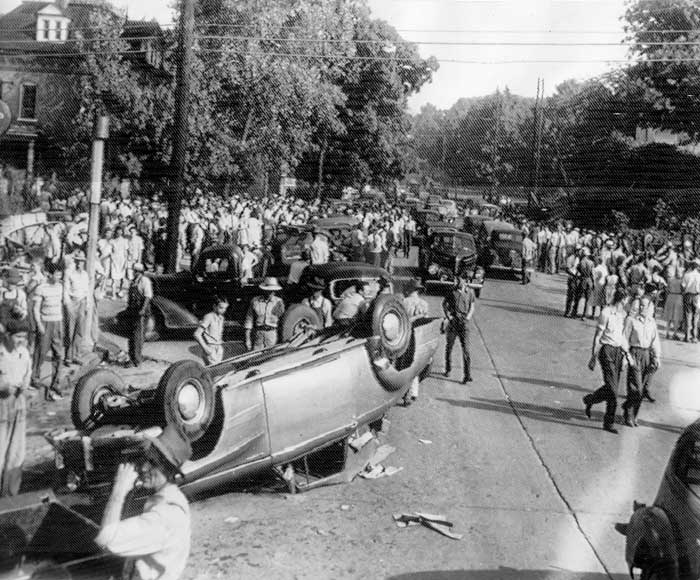
A crowd gathered at the jail, Athens, Tennessee, 1946, Tennessee Archives Photograph Collection.
After some rioting and violent reprisals against police cars and some particularly cruel deputies, the battle was over. Amazingly, while many were wounded, no one died that night, even in the subsequent riots. Six of the 12 ballot boxes were disposed of due to tampering by Cantrell and his men. The remaining six ballot boxes showed a clear victory for the veterans for all five offices of the election, including the position of sheriff. Each veteran candidate won at a proportion of roughly two votes to everyone against.
The veterans called a meeting to plan what to do next. The 400 people at this meeting elected a committee to preserve law and order and an armed militia in case Cantrell returned to retake the town. But Cantrell never came back. The only person with charges brought against them following the Battle of Athens was the man who shot Tom Gillespie.
Though Cantrell’s political machine had been broken, not everything was perfect now that he was gone. Though some reforms were passed by the GIs, according to White -- who became a deputy -- the fee system stayed in place for another four years, although it was nowhere near as abused compared to the decade of Cantrell’s regime.
However, the media was not exactly sympathetic, with many reporters writing that the people of McMinn should have found a peaceful solution for reform. But anyone in McMinn County could have told them that peaceful reform was made impossible by Cantrell and Mansfield, who had stopped fair elections by any means necessary. One of the more conscientious appraisals of the Battle of Athens came from former First Lady Eleanor Roosevelt. She wrote, “If a political machine does not allow the people free expression, then freedom-loving people lose their faith in the machinery under which their government functions.” She explained that any government, whether local, state, or national, must guarantee that it can express the will of the people it failed to do so, Eleanor warned, “their days are numbered.”
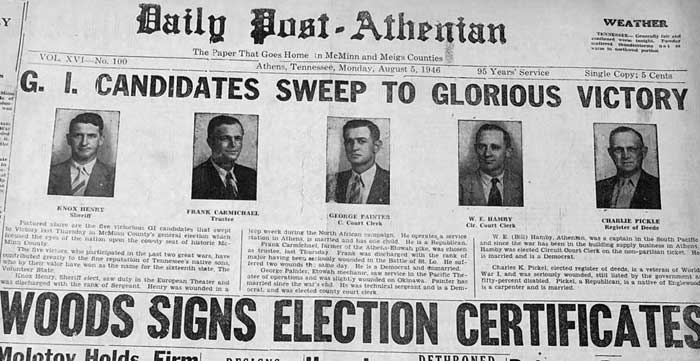
Daily Post Athenian, August 5, 1946.
Were the veterans of McMinn justified in their violent overthrow of the corrupt local government of McMinn? It is hard not to think about the Declaration of Independence, where Thomas Jefferson wrote of his fellow Americans, “When a long train of abuses and usurpations, pursuing invariably the same Object evinces a design to reduce them under absolute Despotism, it is their right, it is their duty, to throw off such Government, and to provide new guards for their future security.” Mirroring this sentiment, Abraham Lincoln, in his first inaugural speech, said, “This country, with its institutions, belongs to the people who inhabit it. Whenever they shall grow weary of the existing government, they can exercise their constitutional right of amending it or their revolutionary right to dismember or overthrow it.”
But even justified revolutions are messy affairs that never result in utopian outcomes. Cantrell was overthrown, but that didn’t immediately fix McMinn County’s issues. Regardless, the Battle of Athens teaches us the valuable lesson of vigilance. Today, as the state has consistently expanded in size and scope, passing more laws than any human anyone could ever read, keeping the state accountable to the citizens it ought to serve is more important than ever.
©Paul Meany, Libertarianism.org, July 2021. Republished with permission September 2022.

Paul Meany, Interim Director of Libertarianism.org
Paul Meany is the Interim Director and Editor for Intellectual History at Libertarianism.org, a project of the Cato Institute. Most of his work focuses on examining thinkers who predate classical liberalism but still articulate broadly liberal attitudes and principles. He is the host of Portraits of Liberty, a podcast about uncovering and exploring underrated figures throughout history who have argued for a freer world. His writing covers a broad range of topics, including proto-feminist writers, Classical Greece and Rome’s influence on the American Founding, ancient Chinese Philosophy, tyrannicide, and the first argument for basic income.
Also See:
History of the Volunteer State – Tennessee

